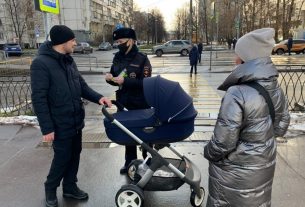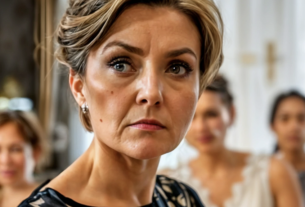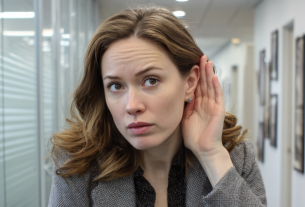When Mark said that, it felt like a sudden ringing filled my ears, drowning out reality. We were standing in the kitchen—the very heart of the world we once shared—where the air was thick with the smell of fried onions from our recent dinner and the sweet steam of freshly brewed tea. He stood with his palms braced on the back of a chair, gripping the wood so hard his knuckles turned white. And in his eyes—the eyes I had always thought of as my own—there was something cold, bottomless, and utterly alien.
“What did you say?” I breathed, feeling the floor vanish beneath my feet. I blinked, trying to clear my vision, to wipe away that chilling look.
“You heard me perfectly,” his voice was quiet, but there was steel humming in that quiet. “My mother needs a kidney. According to the tests, you’re the only suitable donor. It’s fate, Alisa. You’re obligated to help.”
Those two words—“you’re obligated”—stabbed deeper than the loudest scream. I froze in the middle of my own kitchen, hands wrapped around a warm mug, unable to understand where the man I loved had gone, and who this stranger with the icy voice was, demanding I give up a part of my body to save his mother.
“Obligated?” I repeated, my own voice sounding distant and foreign. “This isn’t about giving flowers or cooking soup. This is serious surgery! It’s a huge risk to my health! I’m not mentally prepared for that!”
“Not prepared?” he clenched his teeth, a shadow passing over his cheekbones. “My mother gave me life. She raised me alone, gave everything she had. And you, my wife, should at least try to save her. That’s our duty—yours and mine.”
He spoke calmly, evenly, but in every intonation there was such unshakeable certainty that there was no doubt—my opinion, my feelings had already been taken off the table. The verdict had been handed down; all that remained was to carry it out.
I laughed—short, hysterical, almost soundless. That laugh was an attempt to shake off the crushing weight, to bring even a drop of common sense back into this absurdity.
“Mark, do you even realize you’re asking me to give up a part of myself for a woman who can’t stand me? Who, from day one, pretended I wasn’t worthy of her son? Think of the things she’s said, the way she’s looked at me!”
He said nothing. He just looked at me, and in his gaze I read incomprehension and disappointment, as if I were the one committing the worst betrayal.
Vera Mikhailovna… Her image rose before my eyes as if alive. How many bitter minutes, how many unspoken grievances and secret tears were tied to that woman. She had a domineering, unyielding character and a constant habit of complaining—about fate, about her health, about everyone’s lack of attention. She never ceased speaking of her fatigue and ailments, yet her eyes always burned with a sharp, piercing spark—the very one that seared right through me when, at twenty-six, full of hope, I first crossed their threshold.
“Not the wife I wanted for him,” she had tossed out, as if cutting something off—and that phrase burned into my soul like a red-hot needle, leaving a scar for life.
About ten minutes after our painful exchange in the kitchen, I happened to overhear him speaking with her on the phone. His voice behind the door was muffled, but the words were clear.
“Mom, I talked to her. She hasn’t agreed yet… Don’t worry, I won’t leave it like this. I’ll try again, I’ll persuade her.”
I couldn’t stand it and walked out of the room, stopping in front of him.
“Are you seriously discussing my body, my health, as if this were about buying new furniture or taking a resort trip?” I asked, my voice trembling.
“Alisa, you just don’t want to understand. Time is passing; there’s none left. If not you, then no one can help her. There isn’t another donor.”
I didn’t close my eyes that night. I lay beside him, and from his side of the bed came such a chill it felt as if an icy, impenetrable wall had grown up between us. We were so close, and at the same time a chasm separated us.
In the morning he set a stack of papers in front of me—the test results, medical reports, some signed forms. Everything had been prepared and arranged, as if my consent were merely an annoying formality to be dispensed with. I stood there, holding those pages, unable to believe my eyes. He hadn’t even asked me, hadn’t discussed it—he had simply arranged it all behind my back.
“You decided everything for me,” I said dully, a lump in my throat. “Without my knowledge. Without my will.”
“I decided what had to be decided for her sake. And you, as my wife, should be by my side when things are hard. You should support me.”
It wasn’t a plea for support. It was a full-blown ultimatum, draped in words about duty.
Days passed, turning into one continuous, oppressive wait. He became a complete stranger. He stopped speaking to me, answered in monosyllables. He ate breakfast in silence, got ready for work in silence, returned in silence. No familiar tender words, no warm touches. His silence became the most refined torture, a crushing quiet in which I gradually lost myself.
One evening I again heard his whisper through the wall. He was speaking to his mother.
“Is she still being stubborn? Can’t she see the happiness she’s been given?”—Vera Mikhailovna’s voice carried clearly through the receiver.
“Stubborn. Thinks I’ll beg her, get down on my knees.”
“Don’t you dare agree to any of her conditions. Be firm. Let her live alone without your support—she’ll understand everything right away and come crawling back.”
“Live alone…”—those words stuck in my mind like a splinter. They had already decided everything for me. My opinion, my feelings carried no weight.
A few days later he really did say, coldly and detached:
“I’m going to my mother’s. She’s gotten much worse. She needs constant care.”
“And me?” I asked, hardly hoping anymore. “What about us?”
“You should think about your behavior. Think hard. Maybe your conscience will finally wake up and you’ll act like a human being.”
He left, slamming the front door.
I was alone in the apartment that had once been so warm and cozy and now felt utterly empty. I wandered from room to room as if through a sun-scorched desert. Without his presence—even that cold presence—everything seemed alien and unnecessary. Even my favorite mug on the shelf felt like it wasn’t mine.
I tried to live as before: to work, to read, to meet friends. But my thoughts kept circling back to the same thing: what if he was right? What if, had I shown magnanimity and agreed to save his mother, we could have gotten back the happiness we once had? But then, like the crack of a whip, I remembered her caustic, biting words: “I don’t need you in this family. My son suffers because of you; I can see it.”
No. Not for anything in the world.
About a month later, our former neighbor, a kind and talkative woman, casually mentioned that Vera Mikhailovna had been admitted to the regional hospital—regular dialysis, serious complications had begun. And Mark—every day, constantly at her bedside. He never called me. Not a single line.
Then I saw a photo on social media: he was sitting by her hospital bed, holding her thin hand. The caption read: “A mother is the most precious thing in life. I’m ready to do anything for her.”
My heart clenched so painfully I could barely breathe. In that moment, I understood with absolute clarity: it was over. Between us, everything. Our paths had split forever.
I sat down at the computer and wrote out the divorce petition. I printed it. But several times, when I approached the mailbox, I stopped short—my hand refused to drop the envelope. I lacked that final drop of resolve—as if simply walking away and preserving myself were some impermissible act of heroism.
Two months later, the phone rang. A strange voice introduced himself as a police officer.
“Alisa Sergeyevna, we’re asking you to come in to provide an explanation. Your husband has filed a report about missing family jewelry.”
I nearly dropped the phone.
Jewelry? But they’re mine! They’re what I inherited from my mother! My inheritance!
So now he was accusing me of theft? Of stealing?
The investigator, a middle-aged man with tired, wise eyes, looked at me with undisguised sympathy:
“Unfortunately, this happens. Bitterness, resentment. When people part, they’re capable of worse. Looks like the man is taking it hard—his anger is clouding his judgment.”
I nodded silently, unable to say a word.
That very day I went to the post office and mailed the divorce petition. I put a heavy, final period at the end of our story.
After the court proceedings were over, a strange, almost unnatural calm came over me. It was as if I had carried a sack of stones on my shoulders for ages and had finally shrugged it off, able at last to straighten up and breathe freely.
I packed my things and moved—to the very edge of the city, into a small but very bright apartment with a big window looking out over a narrow but picturesque river. I got a job at a small, cozy bookshop. It always smelled wonderful there—a mix of old paper, fresh coffee, and something elusive that could only be called the scent of peace and quiet.
My hands gradually stopped trembling. My heart, though scarred and wounded, learned to breathe deeply again.
For months I relearned simple things: smiling for no reason, looking at people without searching for his familiar profile in their features, falling asleep without bitterness in my heart.
One day, deep in autumn, with crimson leaves whirling outside, a man of about sixty came into the shop. He wore a long coat, glasses in a thin metal frame, and neat gray mustaches. He took a long time choosing, then bought a thick book on transplantology and lingered a bit at the counter.
“Have you read this?” he asked politely, gesturing to the book. “It’s very profound and powerful. But I should warn you—it’s a heavy read; not everyone can manage it.”
“Unfortunately, I know this topic… all too well,” I answered softly.
He looked at me attentively, without intruding, over his glasses.
“I understand. I’m a transplant surgeon myself,” the man introduced himself. “But allow me to give you the advice I always give my patients and their families: you must not sacrifice yourself against your will. Not for love, not for duty, not for someone else’s well-being. A good deed done out of fear or under pressure doesn’t save the soul. It destroys it.”
Those simple, true words sank deeply into my heart.
After he left, I stood behind the register for a long time, holding another book, thinking about how life can be both simple and incredibly complicated at once.
About two weeks later, Nikolai Ivanovich—as he was called—came into our shop again. This time he brought two cups of fragrant cappuccino and turned out to be much more talkative. I learned he had been widowed several years earlier; his wife had died of sudden cardiac arrest. He was gentle, intelligent, with a certain inner wisdom and calm. He spoke about life without a trace of self-importance or self-pity.
And gradually I began to let his quiet, warm kindness into my own still-healing silence.
In the spring I happened to learn that Vera Mikhailovna had passed away.
It turned out they did manage to find some other, unrelated donor, but the surgery went badly—the body rejected the foreign organ; rejection set in.
The same former neighbor told me.
When I heard the news, I felt neither gloating nor triumph. There was no sorrow either. Only a deep, all-consuming emptiness. I didn’t need her death to justify my choice. I needed only the truth of my own life.
About a week later the phone rang. It was Mark.
His voice was tired, hoarse, and raspy.
“Mom died,” he said without preamble, quietly and hopelessly.
I stayed silent, letting him speak.
“If you had agreed then—if you hadn’t been stubborn—she would be alive. You would have saved her, Alisa… Only you could have saved her…”
In his tone I heard not so much genuine pain as the familiar, calculated accusation aimed at me. The same ice that had been in the kitchen that fateful evening.
“No, Mark,” I answered with surprising calm and clarity. “I wouldn’t have saved her. I would have just died slowly and painfully in her place, after giving up a part of myself. And you would still have kept blaming me for everything. Because to you, love has always been measured only by the size of the sacrifice. And you never understood that real love is salvation, not destruction.”
He was silent for a while. Then he gave a small, contemptuous snort and abruptly hung up.
And after that conversation—paradoxical as it sounds—I finally felt I could truly breathe. The last thread connecting me to that dark past had snapped.
Another six months passed. I learned not to look back. Nikolai Ivanovich began stopping by the shop from time to time, then started inviting me on short walks along the embankment. We would sit on a wooden bench by the water, drink tea from a thermos, and talk about the simplest things—books, the weather, funny incidents from life. And for the first time in many years I felt that beside me was not a judge, not a demanding overseer, but simply a good, understanding person.
“You know,” he said once, watching the river run off into the distance, “over my long life I’ve realized that the world isn’t divided into those who sacrifice themselves and those who demand those sacrifices. The world is divided into those who can understand another person and those who cannot.”
I smiled at his words—and at my sudden insight:
“For a long time I believed my main purpose was to save someone. To save my husband from his problems, to save his mother, to save our relationship.”
“And now?” he asked, turning his kind face toward me.
“Now I just want to live. To wake up in the morning and rejoice in a new day. Without heroics, without feats.”
One day at the very end of summer, when the air had already begun to fill with the coolness that precedes autumn, Artem—an old friend of Mark’s—called me. His voice was uneven and agitated:
“Alisa… You probably haven’t heard. Mark’s in the hospital. His own kidneys failed. The doctors say it’s from severe stress, constant nerves, complications after the flu… He… he asked me to tell you—‘let her come.’”
I sat on my favorite windowsill in my new apartment, my forehead resting against the cool glass, watching the city lights flare up in the twilight. And as clearly as if it were yesterday, I saw that same kitchen, his tense figure, his demanding, alien gaze.
“Artem,” I said quietly but very clearly, “I already tried to save him once—with all my love, with all my soul. He won’t get a second chance. Everyone has their fate, and he made his choice.”
I gently set the phone down.
The next day I deliberately went to the river—to the very place where Nikolai Ivanovich and I often walked. The autumn wind playfully, carelessly stirred the multicolored leaves at my feet, and the air already carried the steady scent of impending rain.
I took a letter out of my coat pocket. I had written it long ago, in that terrible, icy winter when he tried to force me to decide—remain myself or sacrifice myself for his mother. I wrote it to pour out all my pain, but I never gave it to him.
“Mark, you never understood one simple thing: real love is not sacrifice. Love is, first and foremost, protection. Protection of feelings, protection of dignity, protection of the other person’s right to be themselves. If you had stood up for me even once, if you had tried just once to shield me from your mother’s attacks, I might have been ready to do anything for you. But you made another choice. You chose to have me suffer and humiliate myself for your peace of mind and your pride.”
I read those lines aloud, in a whisper, to the wind and the water. Then I slowly, ceremoniously tore the written page into tiny pieces. The wind caught them at once, whirled them up, and carried them into the dark river, taking with it the last traces of that pain.
Right then, as if sensing my state, Nikolai Ivanovich appeared beside me.
“Have you said your goodbye?” he asked gently, without prying.
“Yes,” I nodded. “Now it’s real. Final.”
He handed me a small thermos.
“Here. Hot mint tea. Don’t stand in the wind, don’t get cold.”
I smiled back at him, and there wasn’t a trace of pretense in that smile.
And at that very moment I realized, with amazement, that nothing inside me hurt anymore. Nothing.
That night, for the first time in many, many years, I slept soundly, deeply, and peacefully. No heavy thoughts, no nightmares, no crushing weight of the past. My sleep was serene and healing.
I dreamed a bright, kind dream. I was walking along a sandy shore by a boundless sea, and far away on the horizon the sky was beginning to lighten, heralding the dawn of a new day. The air was clean and astonishingly fresh; each breath felt like a draft of new life, a new chance granted by fate.
I woke with a feeling I had never experienced before—with a sense of complete, absolute calm and freedom. I understood: my life had begun anew. Without fear, without guilt, without the destructive word “obligated.”
Simply. In harmony with myself. In a quiet in which, at last, my own true voice could be heard—the voice of my soul.



